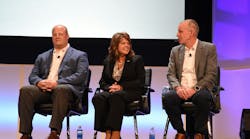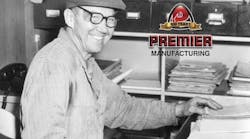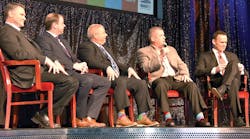It’s not just about price anymore. It’s about building lasting relationships. Even to the point where they’re as intricate as a marriage.
That was the key takeaway from a panel discussion on partnerships that featured: Ed Neeley of Truck Supply Co of South Carolina; Walt Sherbourne, VP of marketing for Dayton Parts; Sean Ryan of Point Spring and Driveshaft Co; and Carl Mesker of SAF-Holland.
Q: Ed, speaking historically in your words, please describe acts or actions that have strengthened your business relationships.
Neeley: Our focus is strictly giving the customer what they want when they want it. It’s just that simple. You have got to be able to have the deliverable. They have to trust in you. It’s kind of like a marriage. You start out, you get your dating going on. You move on down the road. You get the engagement period and finally move to that marriage. That’s what it is. There are ups and downs in that deal, but that’s what you’ve got to have to have a successful partnership with your customers and your suppliers.
Sherbourne: Ed left out one thing. We want to make sure we don’t get divorced, because it could cost us a lot of money. But no, I think it goes back to the little things. You answer the phone when they call. You deliver the response. If you don’t know the answer, you go find it and get back to them. Too often, we sit there and try to say stuff that is really not the answer, and then they find out about it. You have to build that trust and relationship.
Q: Speaking historically, what results were achieved through or from the actions and your relationships? Talk a little bit about your results.
Sherbourne: The results were a very profitable business for not only my company, the supplier, but also Ed’s company and also people within Ed’s company that went out and sold our parts. We all became partners. Instead of 15 sales guys out there, I had another five that were out there selling in my behalf. I had other people out there helping me sell my parts and get my parts out into the marketplace.
Neeley: The main thing we did was make sure we spent the time with the supplier base. You go in there and see what they do and how they operate and how they do it with their employees and see if you can make your guys comfortable with the product you’re trying to sell. That’s part of a partnership. You’ve got to know what you’re selling and get comfortable with the guys. You need some sort of information or resource from them. You can put the face to the voice on the line. That’s really important.
Q: Speaking historically, was price or cost the primary factor?
Neeley: No, not at all. We don’t talk price. Price has to do with your business, but we don’t talk price. You have to have a belief in the quality product you’re selling. If you’re selling quality product out there and you’re delivering it, you’ve got a deliverable. Your customers will pay more if you’re able to hand it to them. You give them what they want when they want it.
Sherbourne: I approach every discussion or meeting without talking about price. Everybody has a lower price in the market. I don’t care what part you’re selling—there’s a better price. The thing you have to deliver is the value. What are you going to do to help get them get the product off the shelf and make more money for their organization? Price, yes, it’s a concern. But that’s the last thing you talk about.
Q: What qualities or identifiers did you see initially or find subsequently in your relationships?
Sherbourne: You really identify the market, who the key players are. And then really see if there’s a need from that key player in the market, that he has a need for you. You can’t just go in there and expect to sell right away. You’ve got to develop that over time. The first time you get shot down, go back. If they’re willing to listen … in the case of Ed, we came back several times. He said, “Get out.” But we went back.
Q: Share the story of how your partnership started.
Sherbourne: Well, my sales guy was in the market looking for a supplier. I always felt I needed to go back, as director of sales at that time, and spend time with customers and understand their needs before we could actually go say, “Here’s the plethora of products we have.” We can have any product, but if he doesn’t have the need to sell it to his customers and the marketplace doesn’t need it, then you’ve got to go somewhere else. We sat down with Ed and his team. That’s the key. Sitting down with the owners of company, that’s one thing. But you have to sit down with the rest of the organization, too. You can’t just come in and say hi to Ed or his other key players. You have to talk to purchasing managers and people behind the scenes who really do the work. Those are the type of things you have to do. There are too many people going into the businesses today and handing a flyer and saying, “Here’s my price.” That’s not getting anywhere. From the distributor side, yeah, price is important, but they also need to know they can depend on you. If they call me on the weekend, I answer the phone. Those texts back and forth on the weekend at 12 o’clock at night get a little concerning, but I know he needs something. So we’re trying to address that need. There aren’t a lot of people who go out of their way to do that anymore.
Q: So Ed, you were on the other side of it. His team wants to come in. Take us into that with how you handled it.
Neeley: When they bring the products in, you want to look at it and see what they’ve got. You want to see where they come from, and what’s backing that product. Because I have to stand up and to my customers say, “This product is a good product.” I have to be able to assure him that will reduce his cost-per-mile 365 days a year. So I have to have a partner somewhere to be able to do that. I’ve got to be able to text him at 2 in the morning and get an answer back. That’s why he does business with me. That’s why I am his partner. He will call me at 2 in the morning and I will answer the phone.
Q: Sean, please tell us a quality or qualities you look for in your relationships.
Ryan: The big one for us is the knowledge base. The training that can be provided to our team from the partners we have. So we have about 20 outside sales guys, about 20 inside sales guys, and they’re trying to sell 200 different lines at any given time. So when they have a relationship with a customer, they might know how to answer the first two or three questions, but when it gets deeper, that’s when we rely on the knowledge and expertise of our partners. They have a great inside team that our guys call all the time and get answers when they need them, so that’s a huge deal for us.
Mesker: When we look for a partner, the one most important thing we’re looking for is, what kind of partnership does our distributor have with the fleet? Those guys will always help me understand their business and their customers. That comes with the relationship they have with the fleet. It’s critically important for us.
Q: Share with us your feelings on the importance of a more comprehensive business relationship other than the buy-sell relationship in today’s quickly evolving markets.
Mesker: It’s a lot more. It’s not transactional. I know a lot of other technology is taking out that personal relationship. It does change it some. But what’s critically important is still there: the relationship that happens. If there’s not trust there, we can’t learn what’s important. We may not even know all its packaging until someone trusts us well enough to tell us. Consequently, they might have things they can sell and take advantage of that they can use to further their business. Recently, we invited them over to a sales meeting. We had about an hour and a half of presentations. The results were an increase in sales. It’s that understanding that they invite us in and the trust they had in us, that they were going to take our product seriously and take it into the marketplace. For us, it’s a lot more than product. It’s interactions, relationships, everything in one nutshell.
Ryan: It’s being there when you need them. We look for long-term partners. We’re trying to partner with somebody for the next five, 10, 15, 20 years. Hopefully, I won’t get fired before then. We’re always looking for the long term. We have to know the product is great and the suppliers have the knowledge to back us up, and when we call, they answer. That’s exactly what this partnership has been.
Q: Can you comment or give an example of any joint activities that have enhanced your relationship?
Ryan: We have a quarterly sales meeting with our entire sales team. That’s an opportunity for our partners to showcase what they’ve got that’s great. Historically, their new and upcoming stuff, technical training, and that in particular with SAF-Holland this past time was a huge increase for us. That’s kind of the ideal partnership in action right there.
Q: How is technology like ecommerce impacting your partnerships?
Mesker: It definitely has an impact. But in the end, they have to have trust in the integrity of the data. This is no different than the integrity of the guy who stands in front of you and tells you, “This is what the product does.” So if you have integrity at that, you need to have integrity with the data you share. The medium is a different medium, but the partnership goes beyond that. Has it changed that? It has changed the way the communication happens, but it doesn’t change the type of communication.
Neeley: The technology has come a long way. The ecommerce deals that are going on, and the eBays and Amazons of the world. The problem, as we all know, will be that the truck is sitting there and he’s got to have it then. He has to have somebody he can trust so he can get it to him right then so he can get his truck up and running. It’s a revenue generator for him. So you’re not going to get that service from the Amazons of the world. They can talk about price all they want to, but the bottom line is, if you don’t give it to him right then, you haven’t done anything.
Q: What additional opportunities and possibilities came forth because of the committed business relationship that you did not expect?
Sherbourne: It went to the personal side. Not only did we have a relationship in the business side of the supplier relationship, but it also then started to become more of a friendship. And whether the business went sour or went up or down, that friendship still stayed. So I can tell you a lot of that goes a long way. You have friends in the industry. We all have friends sitting here in the room. To have the partnerships … Even though I would change jobs, I would still have the friends in the industry. At Christmas, I’ll get a text, Merry Christmas. How are your kids?
Q: What is the largest issue in our industry that requires all of us to be partners on?
Sherbourne: I really think it’s driving to the bottom. Driving the price of parts to a level where you don’t profit in the business. If we don’t sell ourselves and our value to the industry and we just continuously lead on price, we’re not going to win. Our customers aren’t going to win. They’re going to be dissatisfied with the products. We all know when you get to a lower price, you are taking something out of the quality of that part. It’s a very hard problem because you will see this week that everybody is coming out with value brands. It’s a thing that keeps me up at night. Do I want to do that? I really would rather sell my brand on the idea that driving down the highway, my wife and kids are in the car and are not going to get run over by somebody who can’t stop the truck. I don’t know how to solve the problem. I think we have to sit down and try to figure it out together.
Q: How do you maintain effective relationships with vary large organizations that are undergoing constant personnel changes?
Neeley: You keep your hands on the pulse. You stay involved with everybody at that company. You just don’t assume that your sales rep is your only contact. If he leaves, you don’t have anybody to go to. You need to know the operation of the partner you’re doing business with.
Ryan: I agree 100%. The other thing I learned in a short period of time is that it’s inevitable. You go with the flow. You don’t let it frustrate you. You make as many contacts as you can and know it’s going to be a different person at some point, whether it’s in a week or a year. Just keep at it.









